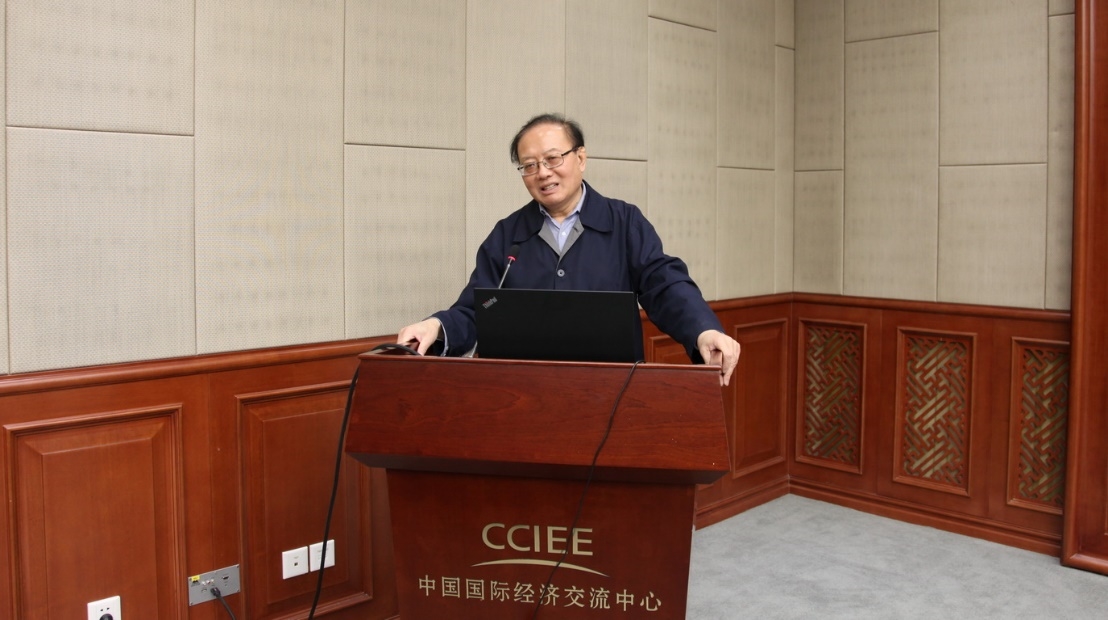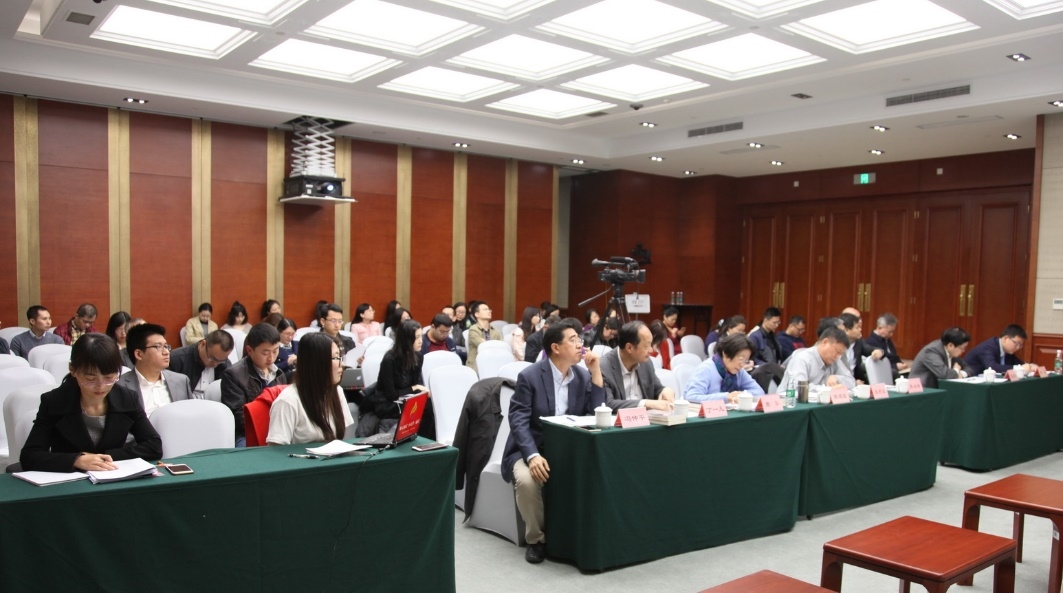CCIEE and Xinhua News Agency National High-end Think Tank Co-host International Economy Seminar: Brexit and the Future of the EU
- Time:2017-04-05
- source:CCIEE
On the morning of March 31, 2017, CCIEE and Xinhua News Agency National High-end Think Tank jointly hosted the 6th International Economy Seminar: Brexit and the Future of the EU. Wei Jianguo, Vice Chairman of CCIEE delivered an opening remark. Zhang Yansheng, Chief Researcher of CCIEE, Zhou Hong, Researcher and Academician of Chinese Academy of Social Sciences, Zhang Xiaojin, Dean of the Department of Politics, Tsinghua University, Ding Yifan, Researcher of the Institute of World Development, Development Research Center of the State Council, Feng Zhongping, Vice President of China Institute of International Studies, Zhang Yongjun, Deputy Chief Economist of CCIEE, delivered their speeches respectively. Tian Dong, Research Assistant of CCIEE, presided over the meeting.
Wei Jianguo said that UK’s withdrawal from the EU is full of uncertainties and we should keep a close eye on the negotiations between the UK and the EU. At the moment, the effect of Brexit on the UK is not as significant as expected, in the medium and long-term, nonetheless, the negative impact cannot be overlooked. As for China, the Brexit will bring new opportunities to the development of China-UK and China-EU relations.

Zhang Yansheng pointed out that a hard Brexit negotiation between the UK and EU will produce a two-year irrational period and after that, rational negotiations will occur. There are several technical problems need to be solved and to complete the entire negotiations process (including trade agreement) will need five to seven years. Leaving the EU is bound to have dramatic effect on the British economy, for instance, London’s financial center status will be more or less adversely affected. From the perspective of three global production networks, Europe will suffer the most from the Brexit. At present, there are obviously more global risks than opportunities, however, if the UK can seize the opportunities brought by the Brexit, transform the crisis into opportunities and strengthen cooperation with East Asia especially with China, then it will be able to seek new way out of the crisis. For example, the UK can enhance its connection with the Belt and Road Initiative and jointly reduce relevant risks. Moreover, the UK should facilitate negotiations of bilateral investment treaty, enhance deep cooperation in science and technology, culture and education.
In his speech, Zhou Hong noted that there are now two divided opinions about the negotiating strategy between the UK and the EU, friendly and hostile. Because of UK’s geopolitical position and its strong capability in the cooperation of security and intelligence, the EU has to consider maintaining a good relationship with the UK. In the medium and long-term, the Brexit will affect both British economy and the EU adversely. Nevertheless, the future of the EU depends on its reform progress. It is still very hard for the EU to get rid of its own governance paradox. Within the EU market, liberalism and the elimination of trade barriers were chosen to establish a single market. For non-EU members, nonetheless, the EU chose to implement protectionism and prevent excess globalization. In the future, China should continue to support the unity and development of the EU because sound China-EU relations are conducive to a fairer and sustainable development of global governance.

Ding Yifan expressed that the Brexit is somehow inevitable. The aim of the traditional British policies toward the EU is to balance Europe and the UK is not very supportive to the EU integration. Nonetheless, the UK still play an important role in the EU, especially in the areas of military, security and international aid. The EU should take the chance to reshape the rules of EU integration and get new development opportunities after UK’s withdrawal. There will be some new opportunities in the China-UK relations and the Brexit will divert capital and trade flow from the UK. If that happens, China’s investment in the UK will have different meaning. Currently, the UK is rather positive about the bilateral investment treaty negotiations with China. In the long-term, the economic complementarities between China and the UK are likely to bring a win-win outcome for both countries.
Feng Zhongping expressed that the Brexit is not a complete split between the UK and the EU, but a compromised withdraw and anti-globalization. In terms of trade and investment, on one hand, the UK wants to withdraw from the UK, on the other hand, it wants to develop trade relations with other economies and embrace globalization. In fact, the UK will continue to maintain close relations with the EU after its withdrawal. In terms of peace and security cooperation, the EU needs UK’s intelligence and its capability of anti-terrorism. Both the EU and UK will calm down and come up with an outcome, which is beneficial to both parties after passing the irrational period. Now, there are still quite a few hurdles, such as the technical problems and a short time window, thus, it is likely that a temporary arrangement will be made first and continue the negotiations later. The EU and the UK are also faced with problems like immigration and border control, the continuity of previous payment agreement and therefore, the future trend remains to be seen. In the perspective of China, the China-EU relations will be brought to a higher level and more opportunities for economic cooperation will appear. More importantly, the two sides should form close cooperation in security, especially security cooperation in relation to the Belt and Road Initiative.
Zhang Xiaonjin noted that although there are some occasional factors, the Brexit is a long-term accumulated result. The doubt about the EU is spreading in Europe and the uncertainty of the EU’s development in the future is rising. The reverse of the European populism has not yet caused significant social structural reform, but it reflects deep changes, especially the changes and risk brought by the development of new media and big data. The aggregation of social media enables concentrated dissemination of information and hence leads to strong political mobilization causing shock to the mainstream political structure. We should keep a close eye on how will the EU meet the challenges mentioned above in the future. In the aspect of China-EU relations, it is said that China will have more significant impact on Europe and therefore, China’s stance, response and attitude will plays a crucial role. Overall, the strategic planning and the role of China’s diplomacy have vital significance on the EU.
Zhang Yonjgun believes that the UK’s withdraw from the EU seems to be irrational but as a matter of fact, it is a reasonable choice. The global average tariff rate was well above 30% when the UK joined the EU years ago, so, an EU membership was conducive to British economy. Nonetheless, the global average tariff decreased sharply to merely 4% now and consequently, there will be no big difference on whether or not the UK withdraws from the EU. Apart from that, if the UK can strengthen economic and trade cooperation with China after its withdrawal, which will more or less push the EU to lower its strict protective measures, this is likely to facilitate global economic development, especially for trade and investment.
In the Q&A section, experts answered various questions from the media and audience.
